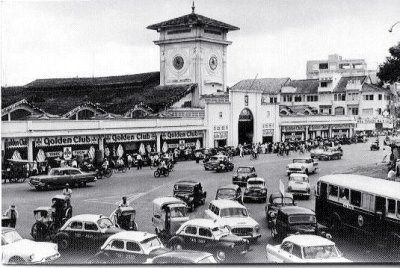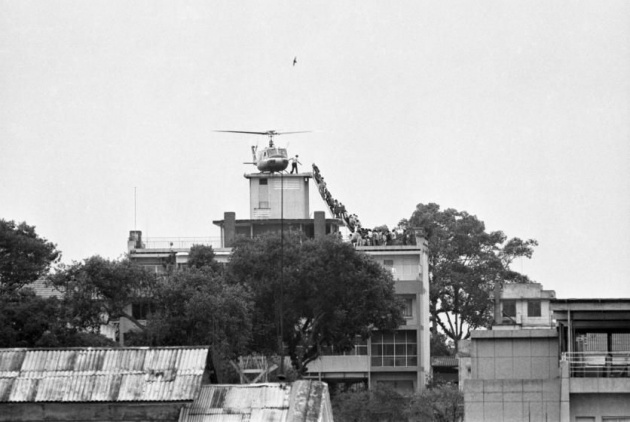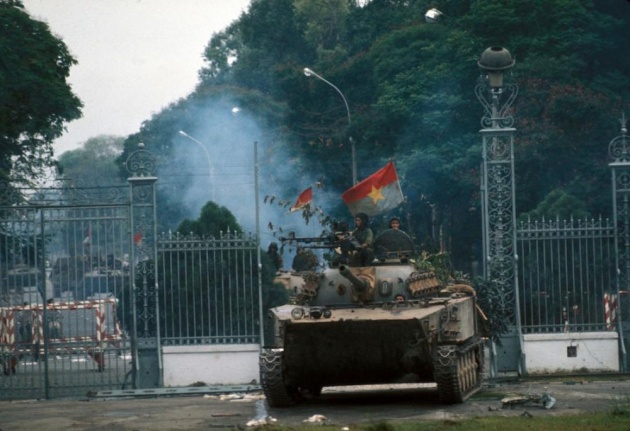THE BEST SAIGON
THE LAST 48 HOURS OF THE VIETNAM WAR .

Forty years ago today, on April 30, 1975, helicopters carried away the last Americans in Saigon as North Vietnamese troops entered the city. What followed showed that the war had changed the United States as much as it had changed South Vietnam.
Only 28 months before the end, President Nixon had announced that the war’s end would come with “peace with honor,” and promised to respond vigorously to any North Vietnamese violations of the peace agreement. But Congress had insisted upon a final end to military action in Southeast Asia in the summer of 1973, and Watergate had driven Nixon out of office a year later. Neither the US government nor their South Vietnamese ally, President Thieu, had shown any interest in implementing the provisions of the peace agreement designed to lead to genuine peace The millions of young Americans who had served in South Vietnam from 1962 through 1972, and the thousands of planes that had flown bombing missions from carriers and airfields in the region, had proven time and time again that they could hold on to most of the country as long as they were there. But the Americans could do nothing about the political weakness of the South Vietnamese government. The communists still effectively ruled much of the countryside and had infiltrated every level of the South Vietnamese government from the Presidential palace on down. American money, not loyalty, had driven the South Vietnamese war effort. With no prospect of American help, the South Vietnamese Army simply collapsed in the spring of 1975 after Thieu ordered a precipitous withdrawal from the Central Highlands. The North Vietnamese won their final victory almost without fighting.
A variant of this sad story has already been replayed in Iraq, where tens of thousands of supposedly American-trained Iraqi Army troops melted away in 2014 when faced with ISIS. There, too, the American-backed government had totally failed to secure the allegiance of the population in Sunni areas. The same thing may well happen in Afghanistan, where a new President has already persuaded the Obama Administration to delay a final withdrawal. That was the overwhelming lesson of Vietnam: that American forces, no matter how large, cannot create a strong allied government where the local will is lacking.
Like most historical lessons, that one lasted for as long as men and women who were at least 40 years old in 1975 held power. Army officers like Colin Powell were determined never to see anything similar happen on their watch, and they kept the military out of similar situations in El Salvador and Lebanon during the Reagan years. Instead, the Soviet Union found its own Vietnam in Afghanistan, and that last foreign policy adventure helped bring Communism down. In 1990-1, George H. W. Bush decided to expel Saddam Hussein from Kuwait, but Powell and others made sure that operation would be carried out quickly, with overwhelming force, and with no long-term occupation of enemy territory. Bill Clinton, who had opposed the Vietnam War, kept the United States out of any ground wars as well.
The neoconservatives who took over policy and strategy under George H. W. Bush were either too young to have fought in Vietnam, or, like Bush (and, for that matter, myself), had served in non-combatant roles. Some of them had persuaded themselves that Vietnam would have been successful if the United States had sent South Vietnam more aid, and all of them were certain they could topple the Iraqi government without serious repercussions. Iraq in 2003 was about twice as populated and much larger in area than South Vietnam in 1962, but they were certain that less than a third of the troops eventually needed in South Vietnam would do the job. They were wrong on all counts. Late in Bush’s second term, American troops showed once again that they could quiet an uprising as long as they remained in the country. But the Iraqi government was determined to see them leave, and last year it seemed that that government might go the way of President Thieu. That has not happened, but Baghdad seems to have lost control of much of the Sunni region for a long time to come.



